
10 Best Therapy Notes Software in 2026: Benefits & Features

In an ever‑evolving healthcare environment, mental health professionals, clinics, and medical practices seek efficient ways to manage client documentation. With the growing demand for accurate therapy notes and streamlined workflows, the best therapy notes software solutions have become essential.
In this article, we explore the top 10 therapy notes software platforms in 2026, their features, benefits, and how to choose the right solution for your practice.
What Is Therapy Notes Software?
Therapy notes software is a specialized digital platform designed to help clinicians and mental health professionals create, store, and manage therapy notes, treatment plans, and progress notes. Such systems often come with features like customizable templates, scheduling tools, billing integrations, and practice management tools. Many of these platforms focus heavily on security, offering HIPAA compliant software solutions that ensure patient confidentiality and protect sensitive patient data.
In simple terms, therapy notes software:
- Allows for efficient creation and management of treatment plans and progress notes
- Centralizes patient data to streamline daily operations
- Offers customizable templates that match different therapy modalities
- Ensures secure and compliant storage of information
- Integrates with third-party systems, such as electronic health records (EHRs) and billing platforms
Why Clinicians Need a Therapy Notes Software
1. Efficiency and Accuracy
Using therapy notes software automates much of the documentation process, reducing errors and saving time for mental health professionals. With customizable templates and built‑in note‑taking features, clinicians can ensure consistent and accurate records.
2. Secure Record Keeping
Storing therapy notes and progress notes in a HIPAA‑compliant software environment safeguards patient confidentiality and makes it easier to maintain compliance with industry regulations.
3. Better Organization and Accessibility
Software platforms offer quick search and retrieval of treatment plans and other records, reducing paper clutter and enabling anytime, anywhere access.
4. Integrated Workflows
Many therapy notes software platforms also function as practice management tools, uniting billing, scheduling, and documentation under a single system.
5. Streamlined Insurance Claims
A unified platform allows for easy billing and insurance submission, reducing administrative burden and ensuring timely reimbursements.
10 Best Therapy Notes Software in 2026
Below is our curated list of the 10 best therapy notes software platforms of 2026. Each stands out for particular features and benefits, ensuring you have a range of options to choose from based on your practice’s needs.
1. Twofold AI Scribe
Twofold AI medical scribe leads the pack for its cutting‑edge AI capabilities, robust compliance features, and ability to streamline therapy notes, treatment plans, and progress notes with minimal manual input. By integrating seamlessly into a variety of clinical workflows, Twofold provides a level of automation and intelligence that can significantly enhance efficiency for mental health professionals.
Key Features
- AI-powered documentation with automated drafting of progress notes and treatment plans based on real-time conversation cues.
- Advanced speech-to-text and natural language processing to minimize typing time.
- Customizable note templates with a wide variety to match different therapeutic modalities (CBT, DBT, family therapy, etc.).
- Seamless integration with EHR and billing, allowing data syncing with insurance platforms for fast claim filing.
- HIPAA-compliant software employing robust encryption and compliance protocols to ensure patient confidentiality.
- Real-time analytics and insights leveraging AI algorithms to monitor client progress and predict potential risks.
Pros
- Highly advanced AI significantly cuts down documentation time.
- Scalable, making it suitable for solo therapists up to multi-location clinics.
- Secure and compliant, with thorough data protection measures.
- Rich integrations with popular EHR and billing systems.
- Versatile customization with adjustable note templates for different specialties.

2. SimplePractice
SimplePractice combines a clean user interface with powerful practice management tools. The platform includes note templates for treatment plans and various types of therapy notes, helping you document sessions efficiently.
Key Features:
- Built-in scheduling and client portal
- Insurance claim submission and billing tools
- Multiple note templates and customizable templates
- Secure messaging platform for patient communication
Pros:
- User-friendly experience suitable for solo practitioners
- Seamless integration with telehealth features
- Comprehensive support resources
Cons:
- Additional telehealth costs for video sessions
- Higher pricing for large group practices
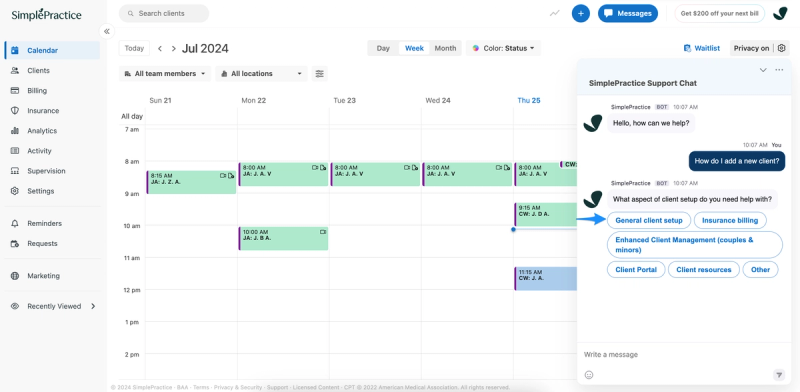
3. TherapyNotes
TherapyNotes is a leading counseling notes software known for its robust documentation and billing features. It offers specialized note types for psychotherapy, counseling, and other treatment modalities.
Key Features:
- Automated appointment reminders
- Billing and invoicing tools with insurance form integrations
- Specific sections for progress notes, treatment plans, and discharge summaries
- Secure patient portals, ensuring patient confidentiality
Pros:
- Expertly designed for mental health professionals
- Extensive library of customizable templates for various specialties
- Integrated scheduling with a color-coded calendar
Cons:
- Fewer customization options for advanced users
- Pricing can be high for multi-location practices

4. Carepatron
Carepatron provides an all‑in‑one solution for medical teams, focusing on simplicity and efficiency. It’s equipped with a variety of note templates and scheduling tools.
Key Features:
- Secure cloud-based platform to store therapy notes and treatment plans
- Integrated telehealth and messaging system
- Automated billing options for practices of all sizes
- AI-driven analytics for patient outcomes
Pros:
- Easy-to-use interface with minimal learning curve
- Extensive documentation features, including progress notes
- Comprehensive telehealth functionalities
Cons:
- Limited third-party integrations
- Customer support is mainly via email
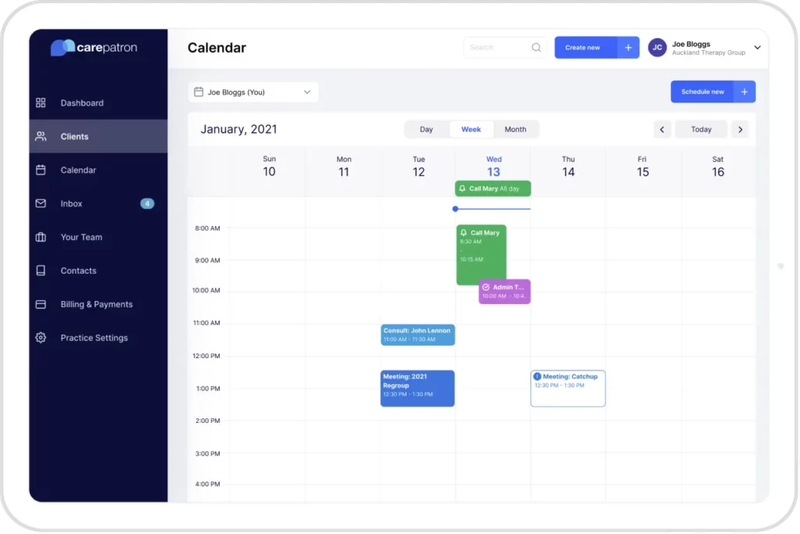
5. TheraNest
TheraNest is a popular choice among solo practitioners and small clinics, offering HIPAA‑compliant software with an emphasis on user‑friendliness and cost‑effectiveness.
Key Features:
- Electronic health records with robust treatment plans
- Income and billing reports for easy financial tracking
- Group therapy documentation for multi-patient sessions
- Secure client portal for intake forms and scheduling
Pros:
- Affordable plans suitable for smaller practices
- Easy tracking of progress notes over time
- Flexible scheduling features
Cons:
- Limited advanced reporting features
- The user interface can feel dated

6. Jane App
Jane App is a versatile platform covering multiple healthcare verticals, making it an excellent solution for interdisciplinary clinics. While it is popular among physical therapists, it also offers robust therapy notes documentation features.
Key Features:
- Online booking and scheduling with automated reminders
- Integrated credit card payments and billing system
- Fully HIPAA-compliant software with encryption
- Customizable templates for progress notes and treatment plans
Pros:
- User-friendly patient booking interface
- Comprehensive multi-disciplinary support for mental health, physical therapy, and more
- Strong reporting and analytics
Cons:
- Pricing may be prohibitive for smaller practices
- Limited advanced AI capabilities
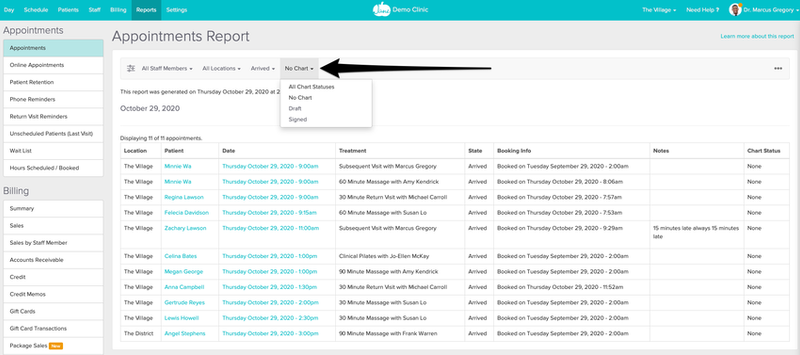
7. Noble Medical
Noble Medical focuses on providing advanced AI capabilities, including voice recognition and auto‑population of fields to expedite therapy notes documentation.
Key Features:
- Voice-to-text transcription for progress notes
- Automated checklists for treatment plans
- Secure mobile application for on-the-go documentation
- Custom dashboards to track client progress
Pros:
- Highly efficient for busy practitioners
- Automated workflows reduce manual errors
- Scalable solution for clinics and larger hospitals
Cons:
- Higher learning curve due to advanced features
- Customer support can be slow during peak times

8. ClinicSource
ClinicSource offers a one‑stop solution, from intake to billing, specifically designed for rehab, PT/OT, and speech therapy. However, its robust platform also suits the needs of mental health professionals.
Key Features:
- Automated scheduling and reminders
- Comprehensive documentation for therapy notes
- Unified system for treatment, billing, and reporting
- Customizable exercise libraries for more physical therapies
Pros:
- A centralized system reduces the need for external tools
- Strong reporting functionality
- Integrated insurance claim management
Cons:
- The interface can feel complex for new users
- Specialized templates are more suited to PT/OT than mental health
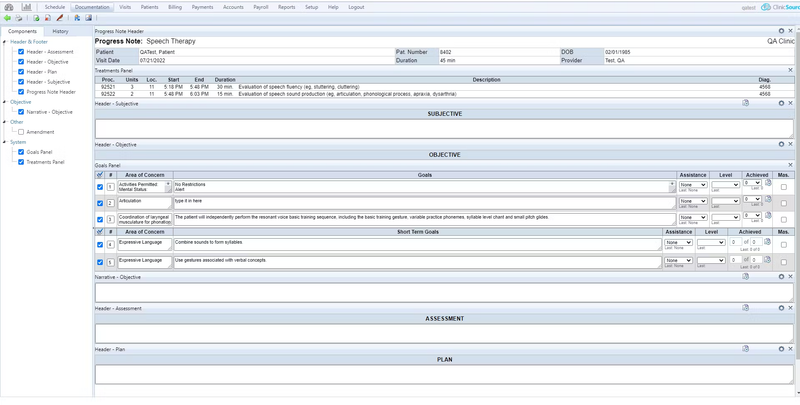
9. Quenza
Quenza stands out for its client engagement features, enabling practitioners to design interactive homework, exercises, and quizzes for patients between sessions. It is also praised for its intuitive design.
Key Features:
- Interactive activity builder for patient homework
- Automated reminders for assignment completion
- Multiple customizable templates for therapy notes and treatment plans
- Secure messaging and client portal
Pros:
- Unique engagement tools for higher treatment adherence
- Mobile-friendly interface for on-the-go use
- Data-driven insights through dashboards
Cons:
- Might be more specialized than necessary for standard documentation
- Higher cost for certain advanced features
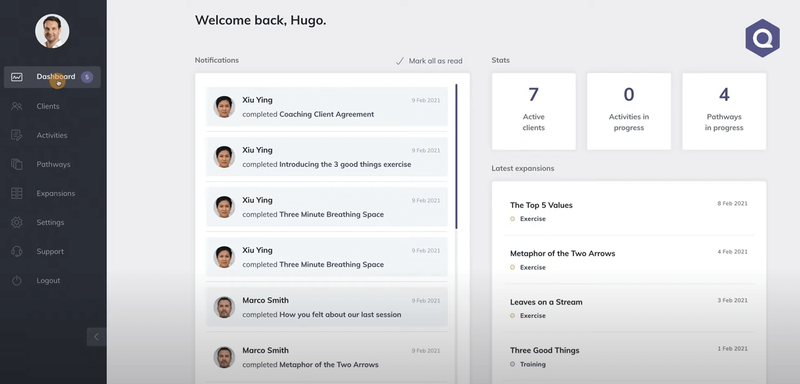
10. ICANotes
ICANotes is a powerful psychotherapy notes software that aims to minimize typing. Its point‑and‑click interface automatically generates narrative therapy notes, thereby speeding up the documentation process.
Key Features:
- Pre-built note templates that adapt to psychotherapy sessions
- Click-and-choose elements for treatment plans
- Detailed medication management and e-prescribing
- Built-in compliance checks for state and federal regulations
Pros:
- Minimizes typing via click-based documentation
- Highly detailed notes for insurance reimbursements
- Excellent for specialized psychiatric settings
Cons:
- Less flexible for non-psychiatric specialties
- Higher price point
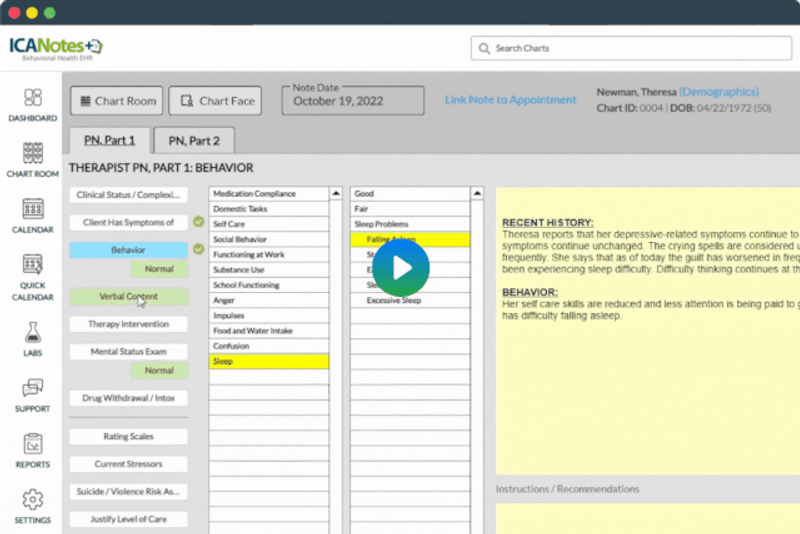
Best Therapy Notes Software Comparison
Below is a quick comparison chart summarizing the 10 best therapy notes software platforms in 2026. Use this as a starting point to evaluate which product might fit your practice.
Software | Key Features | Pricing Model | Best For |
|---|---|---|---|
Twofold Health | AI-powered notes, HIPAA compliant software, EHR & billing integrations | Basic, flexible plans | Practices seeking a productivity boost |
SimplePractice | Scheduling, Billing, Customizable templates | Subscription (monthly) | Solo & group practices |
TherapyNotes | Automated Reminders, Specialized progress notes | Per clinician/month | Psychotherapists & counselors |
Carepatron | AI-driven analytics, Telehealth | Tiered subscriptions | Small to mid-sized practices |
TheraNest | Group therapy support, HIPAA compliant | Tiered subscriptions | Small clinics, solo providers |
Jane App | Online Booking, Payment Integration | Monthly subscription | Multi-disciplinary clinics |
Noble Medical | Voice-to-text, Automated workflows | Custom enterprise plans | Large-scale operations |
ClinicSource | Unified documentation & billing | Monthly plans | Rehab, PT/OT, mental health |
Quenza | Interactive exercises, Client portal | Monthly subscription | Engagement-focused therapy |
ICANotes | Point-and-click notes, E-prescribing | Subscription (monthly) | Psychiatric & psychotherapy |
Therapy Notes Software: Key Features to Look For
When selecting therapy notes software, it’s crucial to identify features that meet your specific clinical and administrative needs. Below are some essential considerations:
Secure Cloud Storage and Data Encryption
A system with robust encryption and cloud storage keeps therapy notes and progress notes safe. Ensuring patient confidentiality is paramount, and HIPAA‑compliant software adds an extra layer of security.
Customizable Note Templates
Look for customizable templates that align with your practice’s methods. Having a library of flexible note templates helps standardize documentation for treatment plans, while also allowing personalization based on therapy style or specialty.
Voice-to-Text and AI-Powered Documentation
Some platforms integrate AI for real‑time transcription and auto‑completion of therapy notes. Voice‑to‑text features reduce manual typing, allowing you to focus more on the client.
Seamless EHR and Billing Integration
A therapy notes software that merges well with external EHRs and billing platforms can significantly streamline administrative tasks, reducing repetitive data entry.
Client Scheduling and Management Tools
Efficient scheduling, appointment reminders, and patient portals improve overall client engagement. These features also help to avoid no‑shows, keep track of treatment plans, and maintain organized records.
Benefits of Using Therapy Notes Software
1. Reduces Administrative Burden
Therapy notes software automates the creation of progress notes, treatment plans, and appointment schedules, freeing up valuable time for clinicians.
2. Enhances Accuracy and Consistency in Documentation
By using customizable templates and automated prompts, you maintain standardized therapy notes while reducing the risk of human error.
3. Enables Better Client Engagement by Reducing Manual Note-Taking
Fewer manual tasks mean more face‑to‑face time with clients. Advanced platforms offer real‑time collaboration tools and patient portals, fostering stronger therapeutic relationships.
4. Streamlines Billing and Insurance Claims
Integrated billing solutions simplify claim submissions, shorten reimbursement cycles, and reduce administrative overhead for mental health clinics.
5. Helps Maintain Compliance with Industry Regulations
Most therapy notes software platforms are designed to be HIPAA‑compliant software, ensuring adherence to legal standards and safeguarding patient data.
How to Choose the Right Therapy Notes Software?
Finding the best therapy notes software for your practice requires careful evaluation of technical features, integration options, and compliance standards. Below are some key considerations:
Prioritize Security and HIPAA Compliance
Look for platforms that have end‑to‑end encryption, secure storage, and robust access controls. Ensuring the software is HIPAA compliant is vital to protect patient confidentiality.
Consider AI and Automation Capabilities
AI tools that facilitate voice‑to‑text note‑taking and automated documentation can expedite treatment plans. Also consider systems that use machine learning to analyze client outcomes for better clinical decision‑making.
Seamless Integrations with Other Tools
An ideal therapy notes software integrates well with EHRs, accounting platforms, telehealth systems, and scheduling tools—reducing the need to juggle multiple applications.
Ease of Use and Customization Options
The software should offer an intuitive interface and robust, customizable templates for therapy notes, progress notes, and other documentation. Even for advanced functionalities, the learning curve should remain manageable.
The Future of Therapy Documentation
The Rise of AI-Assisted Note-Taking
AI is rapidly shaping the future of therapy notes software, minimizing manual data entry by automating session summaries and generating insights into client progress.
Improved Interoperability Between Therapy Notes Software and EHRs
Expect tighter integrations and standardized data formats, allowing therapy notes to seamlessly flow into comprehensive patient records.
Enhanced Security and Compliance Measures
Stricter regulations and advanced encryption standards are pushing therapy notes software providers to offer more sophisticated security features to safeguard patient confidentiality.
Growing Demand for Mobile-Friendly Solutions
As remote care and telehealth grow, providers and clients alike will need secure, mobile‑compatible solutions for on‑the‑go documentation and access to treatment plans.
How Twofold Enhances Therapy Note-Taking
Twofold AI medical scribe is an innovative platform that leverages AI to transform the note‑taking process for mental health professionals. By seamlessly integrating with your workflow, Twofold’s automation tools can generate progress notes and treatment plans with minimal manual input.
- AI-Powered Documentation: Automates the drafting of session progress notes and treatment plans based on real-time conversation cues.
- Customizable: Clinicians can build unique note templates tailored to different therapy approaches, such as CBT, DBT, or family therapy.
- Time-Saving: With advanced speech-to-text and natural language processing, you can drastically reduce the time spent typing or dictating notes.
- Compliance and Security: Twofold follows stringent security protocols to remain a HIPAA-compliant software, ensuring patient confidentiality at every stage.
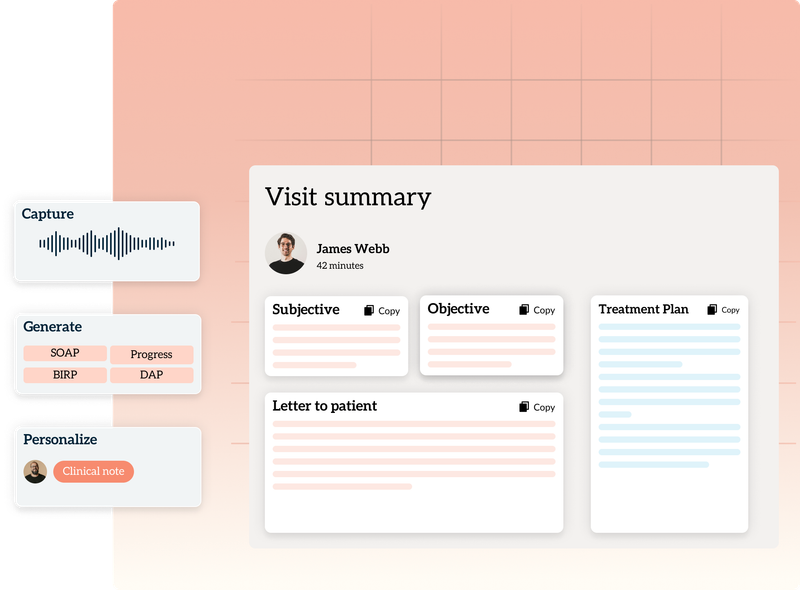
To learn more about creating structured clinical documentation, check out our guide on progress notes and our psychotherapy progress note template.
Conclusion
Choosing the best therapy notes software is a critical decision for clinics, hospitals, and mental health professionals aiming to optimize documentation, enhance patient confidentiality, and improve overall efficiency. Each of the 10 platforms reviewed here offers distinct strengths—whether you prioritize AI‑powered transcription, intuitive design, integrated billing, or robust treatment plans management.
Look for HIPAA‑compliant software that seamlessly integrates with your existing systems, offers customizable templates, and automates administrative tasks. As technology advances, especially with AI and automated note generation, software solutions like Twofold AI medical scribe are poised to transform how we manage clinical documentation in 2026 and beyond.
Disclaimer: This article is for educational and informational purposes only. Always verify software features, HIPAA compliance, and security measures directly with the vendor.
Frequently Asked Questions
ABOUT THE AUTHOR
Dr. Danni Steimberg
Licensed Medical Doctor
Reduce burnout,
improve patient care.
Join thousands of clinicians already using AI to become more efficient.

Best AI Note Takers for Lactation Consultants (2026): AI Scribes for IBCLC Documentation
Compare 6 AI scribes for lactation notes in 2026. See pricing, HIPAA or BAA claims, templates, and real user feedback.

Best online websites and resources for therapist tools and software (2026)
7 trusted websites for therapist practice tools and software: documentation, compliance, billing, marketing, outcomes, and clinical resources.

Do AI Note Tools Really Keep You HIPAA-Safe? Here’s What to Check
Not all AI tools are created the same. Learn the essential checks to ensure your AI note tool is truly HIPAA-compliant.

